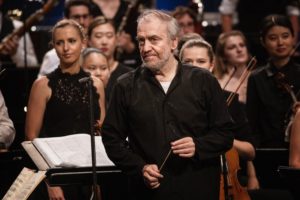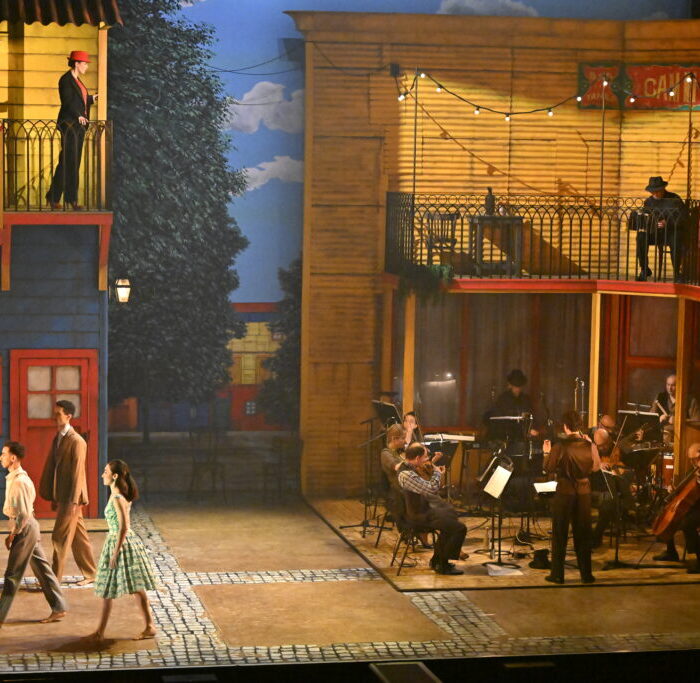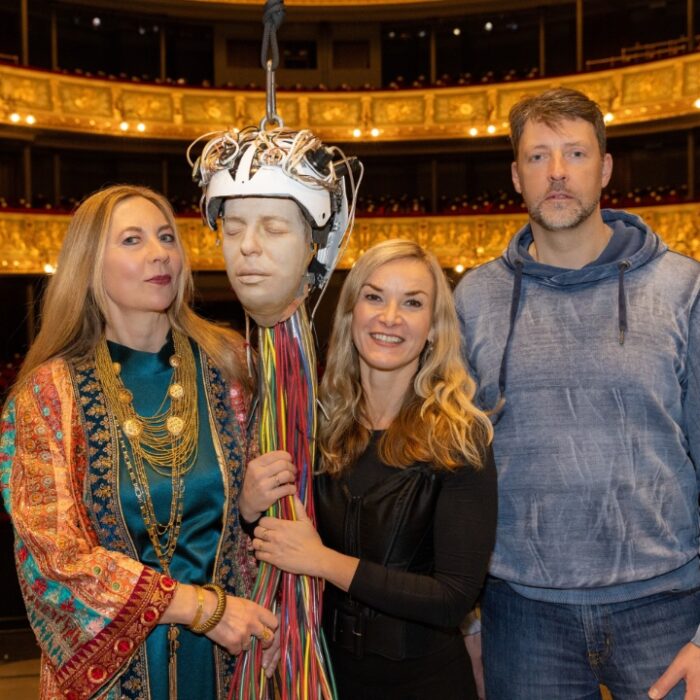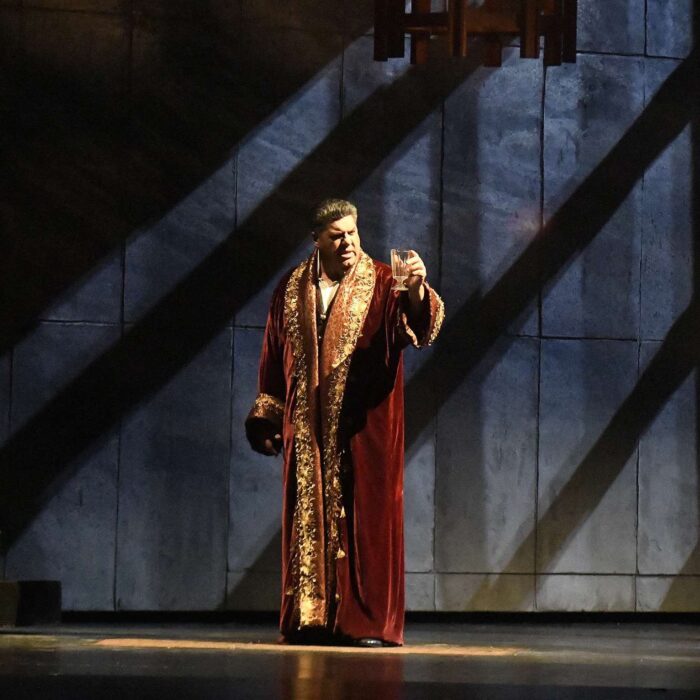
Verbier Festival 2019 Review: Die Frau Ohne Schatten
Valery Gergiev Conjures Up A Magical Presentation
By Alan Neilson(Photo: Diane Deschenaux)
With Europe once again baking under unpleasantly high temperatures thanks to our lack of interest in dealing with the problems of global warming, what better place to go than high up in the Swiss Alps.
Verbier at an altitude 1,500 meters would seem to be ideal. An alpine ski resort, set on a south-facing terrace with splendid views of the high snow covered peaks, forests and green hillsides, sounds almost perfect. However, look a little closer and you can see the same forces at work which are causing the environment to collapse, forces which are strengthening their grip with each passing year, come what may, be it record high temperatures or rising sea-levels.
On the once green hillside rising from the town is a unsightly sprawl of chalets, mostly second homes, time shares or for seasonal letting. The town centre is noticeable for its lack vegetation, concrete is the main material on view; flowers have been relegated to concrete tubs.
The mountain streams that once flowed through the town are now funnelled underground or through concrete-lined channels. And there appears to be no let up, there is plenty of building work taking place, with advertisements proudly boasting new holiday apartments which will soon be available for rent. A moment too long spent dwelling on this can destroy any peace of mind.
Luckily, relief is at hand, at least temporarily, for during July and Summer Verbier hosts its prestigious music festival, which brings together some of the world’s greatest musicians, and one of this year’s headline events was a concert performance of Richard Strauss’ “Die Frau Ohne Schatten.”
A Work About Love
The opera is a symbolistic paean to love, marriage and its fulfilment through children, and of the difficult path we all face in finding our humanity. With its fairytale veneer, its similarities to Mozart’s “The Magic Flute,” to which it has often been compared, are fairly obvious, although the parallels should not be taken too far. Both operas are set in a world in which the human and the supranatural interact, both have two pairs of lovers from fundamentally different backgrounds, who must overcome obstacles to find love, and a deceptive ambiguous female character who wants to destabilise any progress towards harmony.
Staging “Die Frau Ohne Schatten” can be a daunting task, and goes a long way in explaining why it receives so few performances. It requires an orchestra of immense dimensions, including violas and cellos in double sections as well as the violins, extensive woodwind and percussion sections, a large extra brass section, a wind machine, an off-stage organ and more. A traditional setting would require elaborate costuming and spectacular scenery, on a large scale.
A concert performance is, therefore, an acceptable alternative, but when you add in the quality of the musical forces on offer at Verbier it becomes a “must-see.” Not only does it employ soloists of the highest order, but its orchestra, under the direction of Valery Gergiev, comprised of many of the best young musicians from across the world, ensures a quality and an energetic enthusiasm which is almost impossible to find from more established musicians. And they did not disappoint!
Perfect Attention to Detail
Under Gergiev’s masterful direction the orchestra sparkled in a performance of rare quality, in which the rich textures of the score were carefully and meticulously drawn out. The balance between the sections was delicately crafted, so that individual performances were clearly audible, distinct yet fully integrated into the whole.
Gergiev’s attention to dynamic was near perfect, the huge orchestra was never allowed to overwhelm either the singers nor individual sections. Phrasing was tightly managed, whether it was the brass which was allowed to grow gently before blooming brightly, or the delicate filigree motif from the woodwind, everything was precise and organically connected. Even when the orchestra was given its full voice, there was never any sense that it was too loud or out of control. It was testament to the phenomenal quality of the young musicians, of which many individual performances were clearly noticeable, none more so than the lead cellist and lead violinist in their beautifully rendered obbligato parts. This was a performance of power and intensity combined with exquisite delicacy, which captured the emotional depths of the score.
Stepping Into Glory
It was disappointing to hear of three high profile cancellations; Nina Stemme, Matthias Goerne and Brandon Jovanovich. Their replacements, Miina-Liisa Varela, John Lungren, and Gerhard Siegel, however, performed with such quality that any feeling of disappointment was quickly forgotten.
The mezzo-soprano, Evelyn Herlitzius, gave a manic portrayal as the Nurse; never has a singer managed to convey so much with their eyes alone! It was a formidable portrayal, in which she used the hues of her colourful palette to bring depth to her character. Her every phrase was turned with emotional honesty, the lines inflected with dynamic accents and detailed emphases. It was a thoroughly believable portrait of a wild and unstable character.
By the third act the high dramatic soprano, Emily Magee, was in commanding form. If she made a fairly rudimentary start to the first act, it did not last long, and was everything that you could want from a Straussian soprano: an ability to push upwards securely without forcing the voice or loss of quality and then bursting into the tell-tale Straussian bloom. Her vocal characterization was splendidly rendered, the voice versatile, at times strident, at times beguiling, always emotionally gripping.
The Emperor was played by the tenor, Gerhard Siegel. He gave an impassioned performance, although his voice lacked the necessary heft to truly convince in the role. His voice is strong, but one was always conscious of the effort he was making to compete with the orchestra and the other singers, which detracted from his appeal. Nevertheless, the voice has a pleasing tone and his upper register was bright and focused.
The simple-souled, loyal Barak was played by the dramatic baritone, John Lundgren. He has an appealing voice with a warm, attractive timbre. He indulged himself in some fine lyrical singing of real beauty, his voice is powerful, always secure and well-focused, yet his phrasing was so delicate and so sensitive that he managed to reflect the changing emotional state of his character perfectly, in what was simply an excellent performance.
His wife was played by dramatic soprano Miina-Liisa Varela. Like Magee she rose to Strauss’ vocal challenges with apparent ease, and produced an accomplished performance. She displayed wonderful upper register, which was firmly grounded, and was able to soar effortlessly above the orchestra, without any loss of quality. However, she not only possessed power, but also the necessary delicacy, and a pleasing legato.
The messenger was played by the baritone, Bogdan Baciu, who made a fine impression in the relatively small role. He has a resoundingly fresh and clear voice, and articulated his lines clearly and authoritatively. The three ne’er do well brothers of Barak were played by, tenor, Thomas Ebenstein, basses, Milan Siljanov and Julien Van Mellaerts. All impressed in the minor roles. Other roles were taken by members of the young singers of the chorus, some of whom were exceptional; unfortunately they were not named in the paltry programme notes and cast list.
This was indeed a very special performance. Gergiev created a sound of such intense emotional depth that it became physical, from the stomach upwards it was almost painful. The melodies are still playing through my mind, the voices are still clear. Only occasionally is one fortunate enough to witness music making at such a high level. The effect is still with me, I shall remember it for many years to come.


